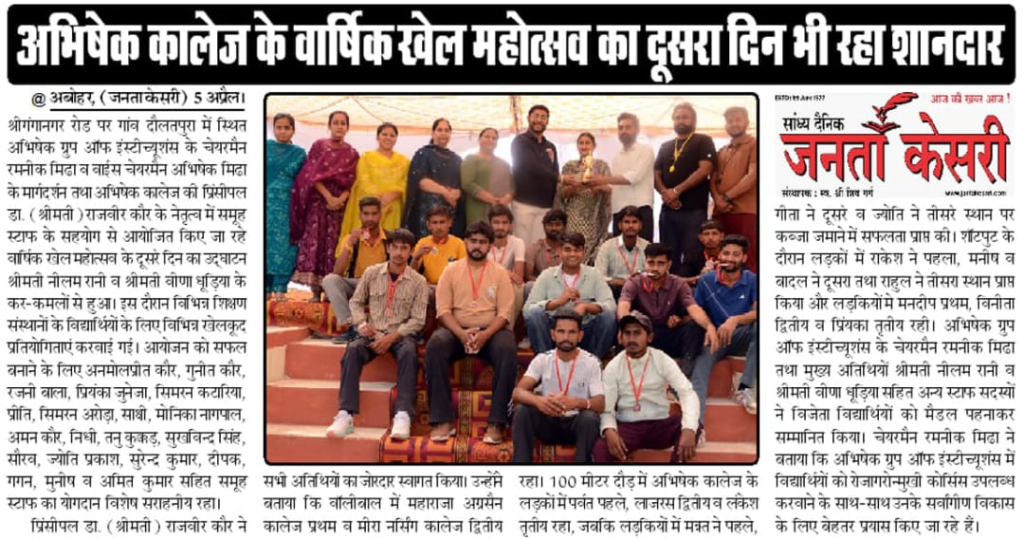1) अभिषेक कॉलेज में अत्यन्त शानदार रहा एथलेटिक मीट का पहला दिन।

2) अभिषेक कॉलेज में के वार्षिक खेल महोत्सव का दूसरा दिन भी रहा शानदार

3) Inter-College Athletic Meet at AGI Campus
4) Mahavir Jayanti

5) PM Scholarship Test

Unlock Your Potential at Abhishek Group of Institutions!
स्कॉलरशिप के लिए आवेदन शुरू
- बी.ए । बी.काम । बी.सी.ए
- डिप्लोमा इन नरसिंग
- डिप्लोमा इन कंप्यूटर । सिविल । मकेनिकल इंजीनियरिंग
- मेडिकल लैब टेक्नोलॉजी
आवेदन की आखिरी तारीख: 10th April to 17th April 2025
टेस्ट की तारीख: 20th April 2025
Appearing for admissions? Ace our PM-Scholarship Entrance Test (PM – SET) for a chance to win up to 100% tuition fee waiver!
🗓 Test Date: 20th April 2025
🔗 Register by 17th April 2025:
https://agi.skeds.in/index.php/registration-pm-set-by-agi-abohar
Contact (+91) 93162-33033 for more information
6) A heartfelt tribute to the martyrs of Jallianwala Bagh Massacre.
7) PM Scholarship Test


8) PM Scholarship Test at AGI Campus.

9) Baisakhi Festival
Every festival in India plays a vital role in preserving and celebrating the infinite historical and religious heritage and legend that binds the country together. Baisakhi is the time of the year when the richly cultured state of Punjab transforms its landscapes into colourful accents of festivity, celebration, and merriment as the people celebrate not just the onset of harvest but also the beginning of a new year for Sikhs. It is a festival that brings the Sikh community from every part of India together as they celebrate their agrarian and religious roots. Together, let us uncover the history and origin, understand the customs and rituals of different states in India, and dive deeper into the traditional attire, jewellery, accessories, and cultural decor that give Baisakhi an identity.
Traditionally also known as Vaisakhi, Baisakhi is one the most culturally rich festivals celebrated in India. The stories of the origin of Baisakhi are at an intersection of religious and agricultural practices. Through time, it was primarily celebrated by the farmer communities of Punjab as they ended one harvest and marked the beginning of a new cycle. Baisakhi is believed to have gained religious significance in the 15th century, when the tenth Sikh Guru, Guru Gobind Singh, founded the Khalsa Panth. It was on Baisakhi of 1699 when Guru Gobind Singh added a layer of umpteenth religious importance to this festival. It is on this day that it is believed he baptised the first five members of the Khalsa, religiously also known as the Panj Pyare and set in stone the principles of the Khalsa.
These principles talk about the importance of Kesh or uncut hair, the Kara, also known as the steel bracelet compulsorily worn by everybody, the use of the Kanga or the wooden comb, the need to wear a Kachera which is a specific cotton undergarment and the essence of carrying a Kirpan or a sword. This establishment of the Khalsa is believed to have marked a new era of righteousness, equality, and bravery. It is now celebrated as Baisakhi to show tribute and respect to these values.
As Sikhs celebrate Baisakhi, they visit Gurudwaras to offer their prayers and listen to Kirtans while participating in the langar. On the day of Vaisakhi, the Akhand Path, a continuous recitation of the ‘Guru Granth Sahib’, also known as the holy scripture of Sikhism, is conducted through all the Gurudwara’s across India and beyond. The highlight of their visit to the Gurudwara is participating in the langar. During this community meal, everyone, regardless of their caste or creed, is welcomed with warmth to take part.
The Nagar Kirtan is an important ritual and a religious process led by the Panj Pyare as they move through the streets, singing hymns and spreading the teachings of Sikhism. The holy scripture of the Guru Granth Sahib is carried in a decorated palanquin and is a part of the process. All devotees offer service towards this process by cleaning the streets or distributing food and water to everyone participating.
In the villages of Punjab, melas or fairs are organised and are the centre of all the activities taking place as people celebrate this joy festival. Activities like acrobatic performances, wrestling competitions, folk dance, and music transcend the atmosphere to mirror the essence of the festivity. Some dance forms that paint the picture of Baisakhi are Bhangra and Gidda, as men and women dance to the rhythms of the dhols and are dressed in colourful traditional attire.
Every ritual performed during the festival of Baisakhi holds deep significance and symbolism. The Akhand Path symbolises devotion and faithfulness towards the Guru Granth Sahib. The act of participating in langar is a representation of the spirit of equality and community. Meanwhile, Nagar Kirtan brings the teachings of Sikhism to the public and showcases the values of unity, service, and humility to all in the community.
Like every other festival, food is pivotal in differentiating Baisakhi celebrations from others. Popular dishes devoured by families and communities are Makki di Roti and Sarson da Saag, Karah Prasad, Pindi Chana, Lassi, Meethe Chawal and Kheer, which reflect the agricultural produce of the region. Meals during Langar are prepared and served by volunteers who show the value of unwavering selfless service and unity.
In Haryana, Baisakhi is celebrated enthusiastically, similar to Punjab, and they engage in traditional dances like Jhumar and Luddi. Delhi sees enormous celebrations as major Gurudwaras like Bangla Sahib and Sis Ganj Sahib are decorated with lights and flowers as devote gather to offer their prayers and participate in the historical Langar. The state of Jammu and Kashmir sees it being celebrated with a mix of Sikh and Dogra rituals. In Uttarakhand, it is celebrated as Bikhauti, while in West Bengal, it coincides with the festival of Pohela Boishakh, the Bengali New Year. It is a festival which authentically resonates with the spirit of community, celebration, and gratitude in its rituals and traditions.